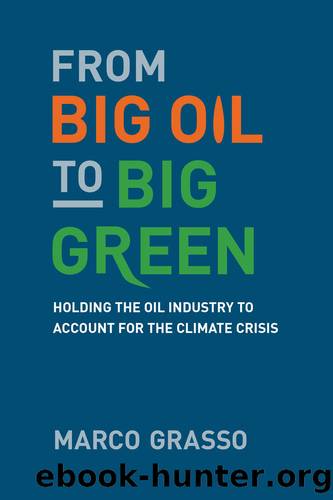From Big Oil to Big Green by Marco Grasso

Author:Marco Grasso
Language: eng
Format: epub
Publisher: MIT Press
BIG OILâS POWERS AND AGENTS OF DESTABILIZATION
Big Oilâs power is overwhelming, but at the same time it seems to have become âpromisingly unstableâ (Sovacool and Brisbois 2019, 1), thanks in no small part to relevant agentsâ growing efforts of power erosion and subsequent destabilization.
Work on regime-destabilization evinces that by and large, destabilization processes occur in three main ways: through the progressive reduction of external financial flows; because of the erosions of legitimacy, the removal of the social license to operate, and reduced support in the external sociopolitical environment; and by means of a declining endogenous commitment of the companies themselves toward the regime they are part of (Turnheim and Geels 2013). The book acknowledges that destabilizing the oil complex is a huge challenge that involves all these modes but, in light of the analysis conducted so far, emphasizes the importance of an expressive and symbolic process of developing new social norms and institutionalizing new moral principles (Abbott 2012; Gunningham 2017) able to activate sensitive intervention points. Agents of destabilization are well suited to developing the transnational organized networks expected to target these entry points for eroding Big Oilâs power.
In fact, agents of destabilization have different specificities and capacities and thus play different roles in undermining the various forms of Big Oilâs power. This section analyzes which agents of destabilization are best suited to confront such diverse forms of powers within the politics of the oil complex. This analysis is crucial for Big Oil to achieve its (first-order) duties, since it obviates the risk of indeterminacy of agents of destabilizationâs second-order duties that would undermine their effectiveness, as highlighted in chapter 4.
It is first worth recalling who the relevant agents of destabilization are before investigating their role and potential in triggering the required intervention. As suggested, the most fertile ground for inducing Big Oil to change its behavior in accordance with the demands posed by its responsibility and duties is through modification of the social, political, economic, moral, and legal contexts it operates in. With regard to this point, the actions that concern the destabilization of oil and gas companies relate to external contexts (the spreading of norms and practices and the undermining of resistance to change) and to politics, the market, and technologies (financial disincentivizing and facilitation of research on and diffusion of clean technologies).
Given the importance of weakening Big Oilâs resistance and the hegemonic nature of the oil complexâin which markets and technologies often seem to dance to the tune played by Big Oil, where the state provides the dance floor and the orchestra (Lindblom 2001)âit is crucial to analyze the role of these agents of destabilization that can be effective for spreading norms and undermining resistance.
Said analysis should almost take priority over other studies into the actual destabilization of Big Oil; understanding the role of such agents may represent a sort of unavoidable prerequisite to exploring the role of the agents involved in more operational tasks such as financial disincentivizing and the search for new technologies. The latter depend largely on government (e.
Download
This site does not store any files on its server. We only index and link to content provided by other sites. Please contact the content providers to delete copyright contents if any and email us, we'll remove relevant links or contents immediately.
| Automotive | Engineering |
| Transportation |
Whiskies Galore by Ian Buxton(41947)
Introduction to Aircraft Design (Cambridge Aerospace Series) by John P. Fielding(33095)
Small Unmanned Fixed-wing Aircraft Design by Andrew J. Keane Andras Sobester James P. Scanlan & András Sóbester & James P. Scanlan(32769)
Craft Beer for the Homebrewer by Michael Agnew(18205)
Turbulence by E. J. Noyes(7987)
The Complete Stick Figure Physics Tutorials by Allen Sarah(7342)
Kaplan MCAT General Chemistry Review by Kaplan(6905)
The Thirst by Nesbo Jo(6891)
Bad Blood by John Carreyrou(6589)
Modelling of Convective Heat and Mass Transfer in Rotating Flows by Igor V. Shevchuk(6411)
Learning SQL by Alan Beaulieu(6244)
Weapons of Math Destruction by Cathy O'Neil(6223)
Man-made Catastrophes and Risk Information Concealment by Dmitry Chernov & Didier Sornette(5961)
Digital Minimalism by Cal Newport;(5716)
Life 3.0: Being Human in the Age of Artificial Intelligence by Tegmark Max(5520)
iGen by Jean M. Twenge(5390)
Secrets of Antigravity Propulsion: Tesla, UFOs, and Classified Aerospace Technology by Ph.D. Paul A. Laviolette(5338)
Design of Trajectory Optimization Approach for Space Maneuver Vehicle Skip Entry Problems by Runqi Chai & Al Savvaris & Antonios Tsourdos & Senchun Chai(5042)
Pale Blue Dot by Carl Sagan(4966)
